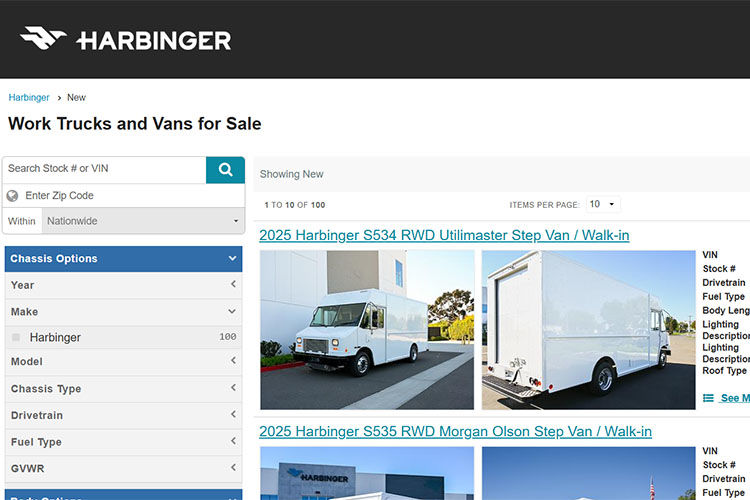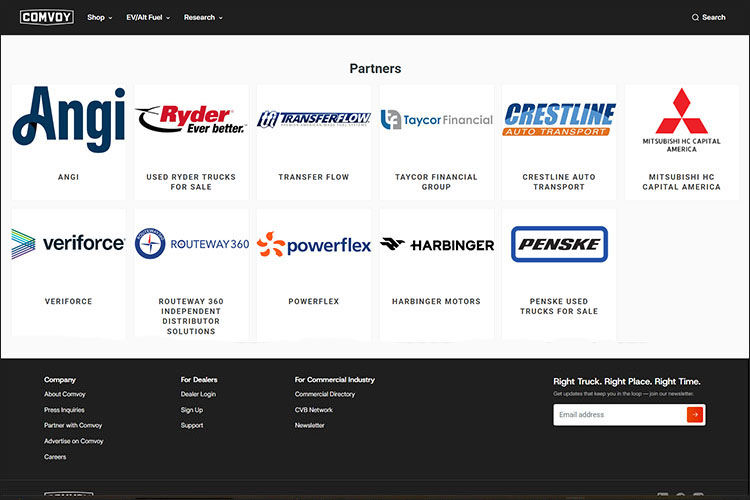Most Fuel Efficient Cargo Vans for 2025 | Compare Top MPG


Most Fuel Efficient Cargo Vans for 2025 | Compare Top MPG
Most Fuel-Efficient Cargo Vans: Top MPG Models, Fuel Tips & Inventory Picks
Fuel costs aren't going down anytime soon. For tradespeople, fleet buyers, and small business owners, finding the most fuel-efficient cargo van can be a game-changer for long-term savings. Whether you're hauling tools, packages, or perishables, cargo van fuel economy matters.
In this guide, we will break down the top MPG models for 2025, smart driving strategies, and how to search Comvoy's nationwide inventory for vans that actually fit the job.
How MPG Is Calculated—and What It Really Means for Buyers
Fuel economy is more than just a number on a window sticker. When comparing cargo vans with the best gas mileage, it helps to understand how those figures are measured.
EPA vs WLTP vs Real-World Figures
EPA ratings (used in the U.S.) tend to focus on standardized city and highway tests, while the WLTP (used in Europe) leans more toward real-world simulations. But neither captures the full picture when your work van is loaded with gear, idling in traffic, or tackling steep hills.
Factors That Impact MPG: Payload, Driving Conditions, Engine Choices
Several key factors influence your van’s real-world fuel economy—some you can control, others you can plan around. Understanding these helps fleets and business owners make smarter operational decisions:
- Payload weight: The heavier the load, the more fuel your van will consume. Hauling close to maximum capacity forces the engine to work harder, especially when accelerating or climbing hills. Staying within optimal payload limits can noticeably improve your miles per gallon (MPG).
- Road type and terrain: Where you drive matters. Stop-and-go city driving drains fuel faster than steady speeds on open highways. Hilly or uneven terrain also puts additional strain on your engine, decreasing fuel efficiency.
- Driving habits: Aggressive driving, like rapid acceleration, hard braking, and excessive idling, can significantly reduce MPG. Maintaining smooth, consistent speeds and limiting idle time can lead to big fuel savings over time.
- Weather conditions: Temperature extremes can affect engine performance and fuel economy. In hot weather, running the air conditioning increases fuel use. In cold weather, engine warm-ups and heater usage also contribute to reduced MPG.
- Engine and powertrain: Your van’s powertrain setup plays a major role in fuel efficiency. Diesel engines often outperform gas in highway MPG, while hybrids and electric vans shine in urban settings with frequent stops. Choosing the right engine type for your route and usage patterns is critical to maximizing MPG.
Small vs. Full-Size Cargo Vans: Which Offers Better Mileage?
If you’re trying to choose between compact and full-size vans, the answer depends on what you’re hauling, but small vans typically win on MPG.
Small Van Leaders: Ford Transit Connect, Nissan NV200, Ram ProMaster City
When it comes to fuel economy, compact cargo vans are tough to beat—especially for businesses that operate in urban areas, run frequent delivery routes, or simply don’t need the extra space (or fuel cost) of a full-size van. These smaller commercial vehicles are nimble, affordable, and consistently among the most fuel-efficient cargo vans on the road.
Van Model | Fuel Efficiency (MPG Combined) | Key Highlights |
25–26 MPG | One of the top fuel-efficient small vans. Ideal for urban fleets and mobile businesses. | |
~25 MPG | Compact design perfect for tight city streets. Discontinued in the U.S., but a smart used van option. | |
24 MPG | Best-in-class payload for its size. Great for trades and services needing space without full-size costs. |
Full-Size & Medium Contenders: Ford Transit, Mercedes Metris, Sprinter
Need more space without sacrificing fuel efficiency? These full-size and midsize cargo vans offer solid MPG for their class:
Van Model | Fuel Efficiency (MPG Combined) | Key Highlights |
Ford Transit (Diesel) | Up to 22 MPG | Full-size capacity with strong fuel economy—ideal for long-distance fleet operations. |
19–22 MPG | Midsize van that balances compact maneuverability with ample cargo space and smooth handling. | |
Up to 21 MPG (Diesel) | High-roof and long-wheelbase configurations make it a top performer in the heavy-duty van category. |
If you’re also exploring options for larger vehicles, check out our listings for the most fuel-efficient semi truck.
Diesel vs Gas vs Electric: Fuel Types Compared
With more fuel types available than ever, choosing between diesel, gas, or electric powertrains is no longer just about personal preference. It’s a strategic decision that can significantly affect your operating costs, environmental footprint, and long-term return on investment (ROI). Each option has distinct strengths depending on your use case, budget, and fleet goals.
Diesel’s MPG Edge in Full-Size Vans
Diesel engines have long been favored in the commercial sector, especially for full-size cargo vans. Their ability to deliver high torque at low RPMs makes them ideal for hauling heavy payloads and traveling long distances. Diesel typically offers superior fuel economy compared to gas, particularly at highway speeds, where steady cruising allows the engine to operate at its most efficient.
While diesel vans may have a higher upfront cost and require DEF (diesel exhaust fluid) and regular emissions system maintenance, the long-term savings on fuel—especially for high-mileage businesses—can outweigh those costs.
If your fleet spends most of its time on intercity routes or long hauls with a full load, diesel still provides one of the best MPG returns among internal combustion options.
Gasoline for Lower Upfront Costs and Flexibility
Gas-powered vans remain a popular choice for businesses with lighter daily driving needs or more urban-based operations. Gasoline engines are generally less expensive upfront than diesel, both in terms of vehicle cost and maintenance. They also offer quicker cold starts, which is beneficial for stop-and-go city driving or climates with harsh winters. However, gas engines tend to deliver lower MPG overall compared to diesel, especially under heavy loads or at sustained highway speeds.
For small business owners or those running local service routes, gas-powered vans offer a practical balance between affordability and capability, especially if long-term mileage is lower.
Emergence of EV/Hybrid Options
Electric and hybrid cargo vans are rapidly becoming a realistic and attractive option, particularly for urban delivery fleets and last-mile logistics. All-electric vans like the Ford E-Transit offer zero-emission driving, lower maintenance requirements, and predictable electricity costs that help stabilize fuel budgets. They’re well-suited for short daily routes with consistent mileage, and as charging infrastructure improves, range anxiety is becoming less of a concern.
Hybrid models blend electric and gas power to extend range while still reducing emissions and fuel usage. 2025 is expected to bring an even broader range of hybrid and electric commercial trucks and vans to market, further expanding your options.
EV commercial trucks may have higher upfront costs and require investment in charging infrastructure, but they also qualify for various government incentives and deliver significant savings in long-term fuel and maintenance costs, making them a smart choice for sustainability-minded fleets.
Fleet Strategies & Driving Tips to Maximize MPG
Even the most fuel-efficient cargo van will not help much if it’s driven inefficiently. Smart and fuel-efficient fleet strategies can lead to real savings over the long haul. These fleet management strategies can help you boost MPG and cut fuel costs:
- Manage vehicle weight
Every extra pound affects your MPG. Overloading your van increases engine strain, leads to faster wear on components, and forces the vehicle to burn more fuel. Sticking to the manufacturer’s recommended payload ensures your van operates efficiently while maintaining safety and handling.
- Plan efficient routes
Route optimization is one of the most effective fleet strategies for improving fuel economy. By using GPS-based software or fleet management tools, you can avoid traffic congestion, reduce idle time, and eliminate unnecessary detours. Fewer starts and stops along the route translate to better MPG.
- Control your speed: Driving faster than necessary wastes fuel. In fact, for every 5 MPH you drive over the 60 MPH speed limit, your fuel economy can drop by 7% or more.1 Using cruise control on highways helps maintain steady speeds and reduces unnecessary acceleration, keeping fuel usage in check.
- Optimize tire pressure and reduce idling
Underinflated tires increase rolling resistance, which directly lowers MPG. Check tire pressure regularly and keep them inflated to the recommended PSI. Additionally, avoid excessive idling—especially during loading/unloading or breaks—as it can burn up to a half-gallon of fuel per hour, depending on engine size.
- Leverage regenerative braking (for hybrids and EVs)
If your fleet includes hybrid or electric vans, take full advantage of regenerative braking systems. These capture energy during braking and feed it back into the battery, helping extend driving range and reducing reliance on charging or fuel refills.
Browse High-MPG Cargo Vans on Comvoy
Comvoy offers an extensive, unbiased inventory of fuel-efficient commercial cargo vans for every business need. You can also choose the right vehicle based on fuel type, wheelbase, roof height, and more.
Whether you're looking for a compact work van for city jobs or a full-size vehicle that can handle long hauls with better fuel economy, Comvoy lets you narrow down by what matters: price, mileage, gas or diesel, and cargo space. Check out Comvoy to find the most fuel-efficient cargo van to match your business goals.
Sources:
- University Fleet Management. Want more miles per gallon from your car or truck?. https://fleet.unl.edu/fuel-saving-tips/
 About the author: An industry veteran with more than 25 years in the automotive market, Steve Henning is Vice President, Marketing at Work Truck Solutions. Most recently, Steve has been focused on partnering with members of the commercial vehicle ecosystem to provide solutions that help B2B customers efficiently find and purchase vehicles that meet their specific use cases.
About the author: An industry veteran with more than 25 years in the automotive market, Steve Henning is Vice President, Marketing at Work Truck Solutions. Most recently, Steve has been focused on partnering with members of the commercial vehicle ecosystem to provide solutions that help B2B customers efficiently find and purchase vehicles that meet their specific use cases.
Steve has been featured in numerous publications, as well as on podcasts and at events including CBT News, Comvoy, F&I Magazine, YouTube, Work Truck Online, and the Commercial Vehicle Business Network. Connect with Steve on his LinkedIn page.
 Driving Business Growth Through Financial Flexibility: How You Buy Your Truck Matters
Driving Business Growth Through Financial Flexibility: How You Buy Your Truck Matters The Comvoy 2026 Event Calendar: We’ll See You There
The Comvoy 2026 Event Calendar: We’ll See You There Wheel Safety Is Your Business: How to Protect Your Fleet and Your Bottom Line
Wheel Safety Is Your Business: How to Protect Your Fleet and Your Bottom Line Harbinger Electric Step Vans and Cab Chassis Vehicles Now Available on Comvoy
Harbinger Electric Step Vans and Cab Chassis Vehicles Now Available on Comvoy Comvoy’s Partner Network: Your Shortcut to Smarter Fleet Solutions
Comvoy’s Partner Network: Your Shortcut to Smarter Fleet Solutions







